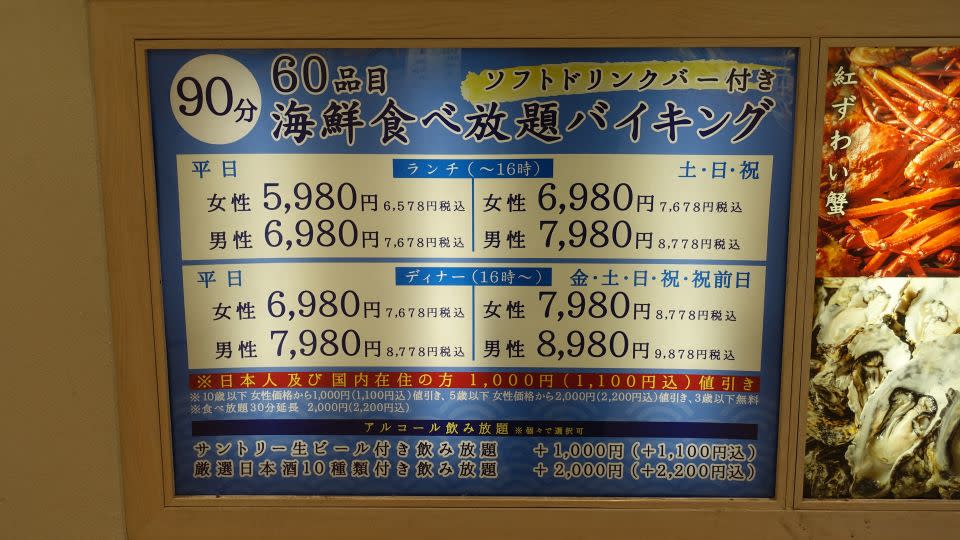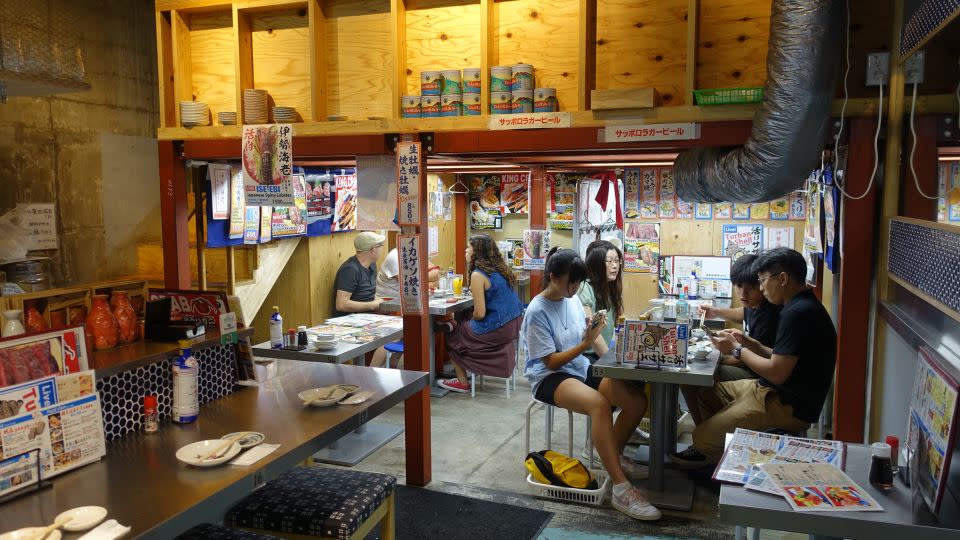Kudos to you if you can speak perfect Japanese and order food at a neighborhood sushi bar in Tokyo.
If you can, chances are that on your next trip to Japan, you may be able to score a better deal by blending in as a local.
Japan has never been a destination known for hiking up prices for foreigners. But overtourism – fueled by a combination of pent-up post-Covid demands (aka “revenge travel”) and the weak local currency – has recently prompted restaurants in the country to consider the merits of differential pricing.
“People say it’s discrimination, but it is really hard for us to serve foreigners, and it is beyond our capacity,” said Shogo Yonemitsu, who runs Tamatebako, an all-you-can-eat seafood grill in Shibuya, Tokyo’s bustling shopping district.
He maintains that he doesn’t charge tourists extra. Instead, he offers a 1,000 yen ($6.50) discount to locals.
“We need (this pricing system) for cost reasons,” Yonemitsu said.
Japan only completely reopened in the fall of 2022 following the removal of pandemic travel restrictions.
This year, spurred by a weak yen that has fallen to its lowest level against the dollar in decades, the tourists are back – in big numbers.
Visitor arrivals to Japan hit a record 17.78 million in the first half of 2024, according to government data – and are on track to break the country’s 2019 record of 31.88 million tourists.
In response, places around the country have begun implementing tourist taxes, imposing visitor caps and even banning alcohol sales in an attempt to curb the effects of too much tourism.
Earlier this year, a resort town in the foothills of Mount Fuji erected a giant net to block views of the iconic peak after tourists flocked to a photo-viewing spot, causing litter and traffic problems.
Meanwhile, tourism authorities in Hokkaido, the country’s northernmost prefecture known for its scenic views and ski resorts, this month urged businesses to set lower prices for locals.
And a mayor in western Japan said he was considering charging foreign tourists more than six times the local entry fee to the UNESCO World Heritage-listed Himeji Castle.
Elisa Chan, associate director of the Chinese University of Hong Kong’s hospitality research center, said differential pricing can be an effective way to combat overtourism.
“The owner may want to make sure that the sudden surge in tourist demand does not drive away all its loyal and frequent local customers. Charging tourists more may be seen as a solution to this,” she said.


Yonemitsu, the restaurateur, said the influx of tourists isn’t simply an issue of adding extra tables.
He said his seafood grill had to hire additional English-speaking staff to take orders, handle bookings and explain to tourists everything from how to tell the difference between sashimi and grilled food items to where to put their luggage. Failing to do so results in “mayhem,” he said.
“Some people say, ‘We don’t do this in our country.’ But think about how bad Japanese people’s English skills are. We aren’t at that level where we can call ourselves a tourism powerhouse yet. We just can’t speak English, and yet we can’t say the wrong things. It’s really stressful,” he said.
While it’s a new phenomenon in Japan, differential pricing is quite common in other parts of the world. As the less-expensive resident prices are often written in the local language, foreign tourists may not even know they paid more.
In Japan, it’s up to every business to decide for themselves if they want to implement two-tiered pricing. That’s not always the case elsewhere, as governments can step in.
In Venice, for example, officials introduced a fee to enter the Italian city and an online reservation system to cope with overtourism.
Meanwhile, some Japanese business owners are trying to be creative.


Shuji Miyake, who runs an izakaya, or informal pub, in Tokyo’s Tsukiji district, offers ramen topped with lobster for 5,500 yen ($35) – four times the price of the shrimp noodles his regulars often order. The premium dish is marketed to tourists, who he said have a higher budget to try new things.
Australian tourist Phoebe Lee said she spent less on a recent two-week trip to Japan than on her previous trips to the country – and she wouldn’t mind paying a little extra if the weak yen is making life difficult for locals.
“This helps support local businesses to continue providing us lucky visitors with amazing experiences and preserve important parts of Japan’s culture, like tiny mom-and-pop restaurants or authentic ryokans (traditional inns),” she said.
CNN’s Junko Ogura contributed reporting.
For more CNN news and newsletters create an account at CNN.com
